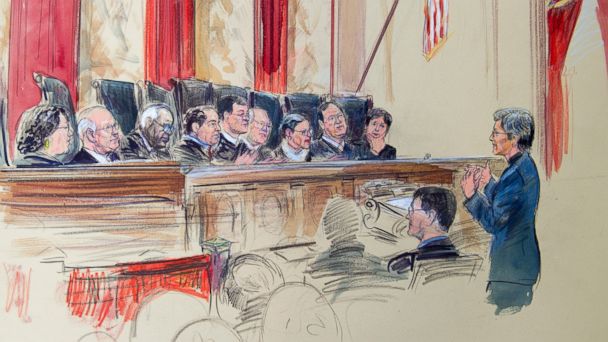READING THE SIGNALS FROM THE SUPREME COURT ON GAY MARRIAGE
Advocates for both sides on the gay marriage debate can point to encouraging and discouraging signs after today’s long-anticipated arguments in front of the Supreme Court — and sometimes the signs came from unexpected places.
Friendly Fire?Right out the gate, liberal Justice Ruth Bader Ginsburg interrupted famed gay-rights lawyer Mary Bonauto, who was arguing the case for the same-sex couples who want to get married. Bonauto began with grand language about the section of the Constitution that’s at stake here, the14th Amendment, but then Ginsburg jumped in with a question that anti-gay-marriage advocates have been pushing. The justice inquired about states’ right to define marriage for themselves without interference from the federal government.
Ginsburg’s question may have been intended merely to get the issue out early and preclude more aggressive questioning from conservative colleagues, but it took many in the courtroom by surprise.
After the argument, Bonauto told ABC News that the justices had “asked tough questions of both sides,” which, she offered, is as it should be.
Similarly, Justice Antonin Scalia was so dissatisfied with the first answer given by Joseph Whalen, the lawyer defending Tennessee against the gay couple suing that state, that the conservative justice responded incredulously with an Amy Poehler-like “Really?” — and a George W. Bush court nominee, Chief Justice John Roberts, joined in, piling on the Tennessee advocate.
Whalen later said he hadn’t understood Scalia’s question the first time.
Justice KennedyEventually, the justices returned to expected form, and court-watchers had their eyes most closely on another justice — Anthony Kennedy.
Kennedy has written the decisions in many recent gay-rights cases, including the Windsor case that struck down the federal ban on recognizing legal gay marriages from the states.
Kennedy, however, is also a big proponent of states’ rights — such as when he voted in a 1995 case to invalidate a federal gun law on the grounds that the feds were overstepping their limits.
Many have portrayed the gay marriage case as a choice Kennedy must make between his belief in the rights of gay people and his belief in the rights of states. Kennedy asked very skeptical questions of both sides.
One central argument of those who support maintaining marriage as an institution solely for one man and one woman is that gay marriage is very new — “newer than cell phones,” as Justice Samuel Alito said during the Windsor arguments. States should have more time to experiment and figure out what works best, conservatives argue, and Kennedy seemed to echo that in questioning gay-rights lawyer Bonauto: “This definition has been with us for millennia. And it it’s very difficult for the court to say, ‘Oh, well, we know better.'”
But Kennedy also asked equally contrarian questions of the other side. The justice seemed outright offended by an argument he felt the lawyer for Michigan was making. Michigan wants to continue not to grant marriage and adoption rights to a lesbian couple with four young special-needs children. Kennedy summarized Michigan’s argument as implying that only opposite-sex couples could bond with their children.
“That was very interesting,” Kennedy told Michigan lawyer John Bursch, “but it’s just a wrong premise.”
Bursch claimed that was not what he meant at all, and Scalia later summarized Bursch’s argument himself: “The existence of same-sex marriages,” Scalia offered, “erodes the feeling of society regarding heterosexual marriages.”
Better for LGBT Americans to Lose?
Another ray of hope for opponents of same-sex marriage came from an exchange that has escaped the attention of many commentators. It began with a question from Roberts about Maine. Roberts, who most court-watchers think will side with the states, pointed out that Maine voters in 2009 banned gay marriage by referendum. Then in 2012, the same voters enshrined marriage rights into law.
“If you prevail [at the Supreme Court],” Roberts said to gay-rights lawyer Mary Bonauto, “there will be no more debate.”
The chief justice concluded by arguing that “people feel very differently about something if they have a chance to vote on it than if it’s imposed on them by the courts.”
This picks up on the themes of a very hot question among scholars: Did Roe v. Wade (which in 1973 recognized a constitutional right to abortion) actually short-circuit a slow, democratic movement towards abortion rights? The argument goes that Roe created a backlash of pro-life activism, fanned the flames of the culture war and has led to more state restrictions on abortion than there would be if the Supreme Court had just let democracy take its course.
Roberts, who has a reputation for savvy in bringing other justices to his side, may have been targeting Kennedy, giving him a way to feel he is promoting the cause of gay rights by voting against them, in this particular case.
With both sides claiming — with reason — a successful oral argument, the only certainty is that anxiety on both sides will remain high up until the day in June when the court decides the fate of the gay couples, and the state laws, involved in the case.







